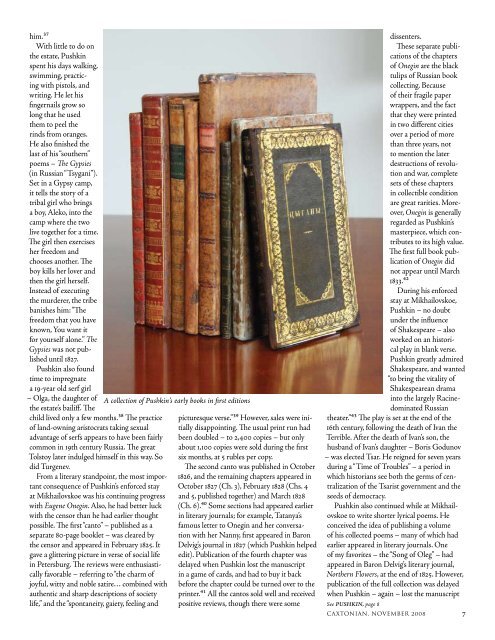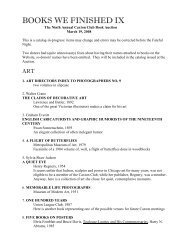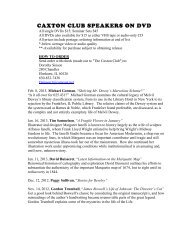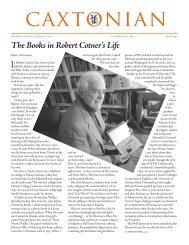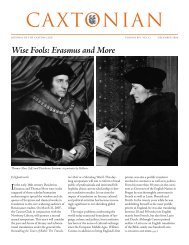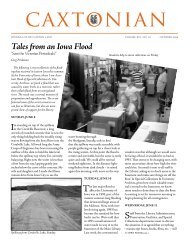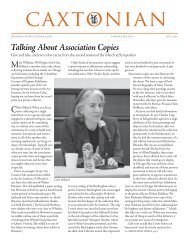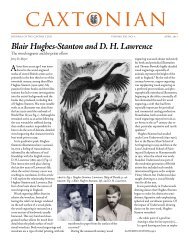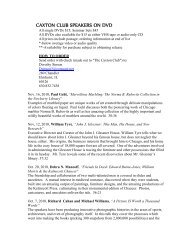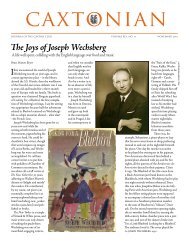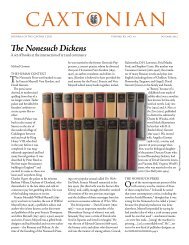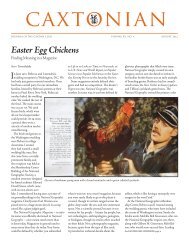Collecting Pushkin - The Caxton Club
Collecting Pushkin - The Caxton Club
Collecting Pushkin - The Caxton Club
You also want an ePaper? Increase the reach of your titles
YUMPU automatically turns print PDFs into web optimized ePapers that Google loves.
him.37<br />
With little to do on<br />
the estate, <strong>Pushkin</strong><br />
spent his days walking,<br />
swimming, practicing<br />
with pistols, and<br />
writing. He let his<br />
fingernails grow so<br />
long that he used<br />
them to peel the<br />
rinds from oranges.<br />
He also finished the<br />
last of his “southern”<br />
poems – <strong>The</strong> Gypsies<br />
(in Russian “Tsygani”).<br />
Set in a Gypsy camp,<br />
it tells the story of a<br />
tribal girl who brings<br />
a boy, Aleko, into the<br />
camp where the two<br />
live together for a time.<br />
<strong>The</strong> girl then exercises<br />
her freedom and<br />
chooses another. <strong>The</strong><br />
boy kills her lover and<br />
then the girl herself.<br />
Instead of executing<br />
the murderer, the tribe<br />
banishes him: “<strong>The</strong><br />
freedom that you have<br />
known, You want it<br />
for yourself alone.” <strong>The</strong><br />
Gypsies was not published<br />
until 1827.<br />
<strong>Pushkin</strong> also found<br />
time to impregnate<br />
a 19-year old serf girl<br />
– Olga, the daughter of<br />
the estate’s bailiff. <strong>The</strong><br />
child lived only a few months.38 <strong>The</strong> practice<br />
of land-owning aristocrats taking sexual<br />
advantage of serfs appears to have been fairly<br />
common in 19th century Russia. <strong>The</strong> great<br />
Tolstoy later indulged himself in this way. So<br />
did Turgenev.<br />
From a literary standpoint, the most important<br />
consequence of <strong>Pushkin</strong>’s enforced stay<br />
at Mikhailovskoe was his continuing progress<br />
with Eugene Onegin. Also, he had better luck<br />
with the censor than he had earlier thought<br />
possible. <strong>The</strong> first “canto” – published as a<br />
separate 80-page booklet – was cleared by<br />
the censor and appeared in February 1825. It<br />
gave a glittering picture in verse of social life<br />
in Petersburg. <strong>The</strong> reviews were enthusiastically<br />
favorable – referring to “the charm of<br />
joyful, witty and noble satire… combined with<br />
authentic and sharp descriptions of society<br />
life,” and the “spontaneity, gaiety, feeling and<br />
A collection of <strong>Pushkin</strong>’s early books in first editions<br />
picturesque verse.”39 However, sales were initially<br />
disappointing. <strong>The</strong> usual print run had<br />
been doubled – to 2,400 copies – but only<br />
about 1,100 copies were sold during the first<br />
six months, at 5 rubles per copy.<br />
<strong>The</strong> second canto was published in October<br />
1826, and the remaining chapters appeared in<br />
October 1827 (Ch. 3), February 1828 (Chs. 4<br />
and 5, published together) and March 1828<br />
(Ch. 6).40 Some sections had appeared earlier<br />
in literary journals; for example, Tatanya’s<br />
famous letter to Onegin and her conversation<br />
with her Nanny, first appeared in Baron<br />
Delvig’s journal in 1827 (which <strong>Pushkin</strong> helped<br />
edit). Publication of the fourth chapter was<br />
delayed when <strong>Pushkin</strong> lost the manuscript<br />
in a game of cards, and had to buy it back<br />
before the chapter could be turned over to the<br />
printer.41 All the cantos sold well and received<br />
positive reviews, though there were some<br />
dissenters.<br />
<strong>The</strong>se separate publications<br />
of the chapters<br />
of Onegin are the black<br />
tulips of Russian book<br />
collecting. Because<br />
of their fragile paper<br />
wrappers, and the fact<br />
that they were printed<br />
in two different cities<br />
over a period of more<br />
than three years, not<br />
to mention the later<br />
destructions of revolution<br />
and war, complete<br />
sets of these chapters<br />
in collectible condition<br />
are great rarities. Moreover,<br />
Onegin is generally<br />
regarded as <strong>Pushkin</strong>’s<br />
masterpiece, which contributes<br />
to its high value.<br />
<strong>The</strong> first full book publication<br />
of Onegin did<br />
not appear until March<br />
1833.42<br />
During his enforced<br />
stay at Mikhailovskoe,<br />
<strong>Pushkin</strong> – no doubt<br />
under the influence<br />
of Shakespeare – also<br />
worked on an historical<br />
play in blank verse.<br />
<strong>Pushkin</strong> greatly admired<br />
Shakespeare, and wanted<br />
“to bring the vitality of<br />
Shakespearean drama<br />
into the largely Racinedominated<br />
Russian<br />
theater.”43 <strong>The</strong> play is set at the end of the<br />
16th century, following the death of Ivan the<br />
Terrible. After the death of Ivan’s son, the<br />
husband of Ivan’s daughter – Boris Godunov<br />
– was elected Tsar. He reigned for seven years<br />
during a “Time of Troubles” – a period in<br />
which historians see both the germs of centralization<br />
of the Tsarist government and the<br />
seeds of democracy.<br />
<strong>Pushkin</strong> also continued while at Mikhailovskoe<br />
to write shorter lyrical poems. He<br />
conceived the idea of publishing a volume<br />
of his collected poems – many of which had<br />
earlier appeared in literary journals. One<br />
of my favorites – the “Song of Oleg” – had<br />
appeared in Baron Delvig’s literary journal,<br />
Northern Flowers, at the end of 1825. However,<br />
publication of the full collection was delayed<br />
when <strong>Pushkin</strong> – again – lost the manuscript<br />
See PUSHKIN, page 8<br />
CAXTONIAN, NOVEMBER 2008 7


